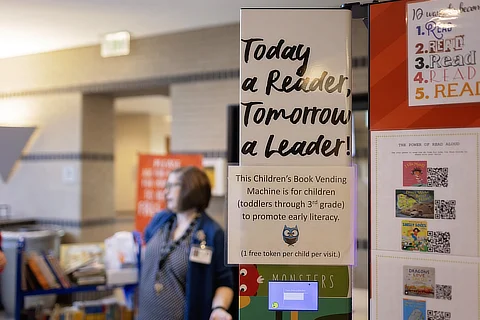
Samford University’s Orlean Beeson School of Education has once again received national recognition for academic excellence and innovation in teacher preparation. The Early Childhood Special Education, Elementary and Collaborative Education (ESEC) program recently earned national recognition from the International Literacy Association (ILA), a prestigious honor that underscores the school’s commitment to developing highly qualified literacy professionals.
The recognition, which will extend through May 2030, signifies that Samford’s program aligns with the ILA Standards for the Preparation of Literacy Professionals 2017. These standards serve as a national benchmark for excellence in preparing educators to meet the complex literacy needs of today’s diverse classrooms.
“This achievement affirms our mission to equip future educators who are not only knowledgeable but also responsive to the needs of their students,” said Amy Hoaglund, associate dean and professor. “It demonstrates that our program is both grounded in evidence-based practices and forward-thinking in its approach to literacy instruction.”
The ILA national recognition is awarded to programs that demonstrate a rigorous commitment to advancing equity and excellence in literacy acquisition. It also places Samford among a select group of institutions nationwide that are leading efforts to transform literacy education through innovation, research and practice.
Graduates from the ESEC program will enter the workforce with a strong foundation in literacy instruction, empowered to meet the diverse learning needs of students across all backgrounds.
“Our faculty have worked diligently to ensure our course work and clinical experiences reflect the best in current literacy pedagogy,” said Anna McEwan, dean of Orlean Beeson School of Education. “This national recognition validates their efforts and positions our students for long-term success in the field.”
At a time when schools across the country face rising demands for skilled educators, Samford’s school of education remains committed to preparing teachers who are capable, compassionate and ready to lead. The school continues to invest in innovative practices; from embedded field experiences and community partnerships to a curriculum that prioritizes cultural responsiveness and instructional agility.
Literacy is considered a cornerstone of personal and societal development. However, recent statistics highlight significant challenges in literacy education across the United States.
While data varies, in recent years statistics suggest that 21% of U.S. adults are illiterate, and 54% read below a sixth-grade level, with 20% reading below a fifth-grade level. In turn, low literacy levels cost the U.S. economy up to $2.2 trillion annually from decreased productivity and increased health care costs. Numerous factors exacerbate the current literacy crisis, factors like “book deserts,” digital distraction, an overemphasis on standardized testing, socioeconomics and insufficient early childhood investments.
These statistics underscore the critical need for effective literacy education programs. Institutions like Samford play a vital role in addressing these challenges by preparing educators equipped with the skills and knowledge to improve literacy outcomes nationwide.
“As the literacy landscape evolves, we are preparing our candidates to evolve with it,” Hoaglund said. “This recognition is a reflection of that commitment.”
